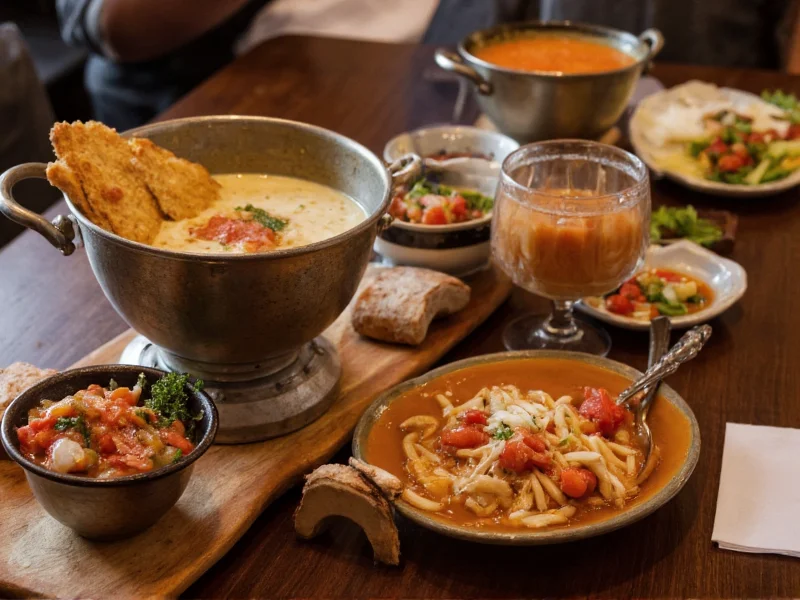Understanding Soup Quality in Restaurant Settings
Not all restaurants that serve soup create equal experiences. The difference between a memorable soup experience and a mediocre one often comes down to preparation details that many diners overlook. High-quality soup restaurants typically simmer broths for extended periods, use fresh ingredients rather than powdered bases, and offer clear information about their soup-making process.
When evaluating restaurants with soup options, look for specific menu language that indicates care in preparation. Phrases like "simmered for 12 hours," "house-made stock," or "locally sourced vegetables" suggest a commitment to quality. Restaurants that specialize in soup often change their offerings seasonally, featuring ingredients at their peak freshness.
Finding the Right Soup Restaurant for Your Needs
Your search for restaurants with soup should begin with clarifying your specific requirements. Are you looking for a quick lunch option, a comforting meal when feeling under the weather, or an authentic representation of a specific cultural soup tradition? Different establishments excel in different areas.
| Soup Type | Indicators of Quality | Best Time to Visit |
|---|---|---|
| Asian Noodle Soups | Homemade broth, fresh herbs, properly cooked noodles | Lunch hours for authenticity |
| Classic American | House-made stock, visible vegetable pieces | Lunch or early dinner |
| Mediterranean | Fresh herbs, quality olive oil, balanced seasoning | Lunch for lighter options |
| Seasonal Specialties | Ingredients matching current season | Check daily specials |
Regional Soup Specialties Worth Seeking
Certain regions have developed distinctive soup traditions that dedicated restaurants preserve. For those searching for restaurants with soup that offer authentic experiences, understanding these regional specialties can guide your selection:
- New England - Look for clam chowder made with fresh clams and without tomato base
- Midwest - Regional hotdish variations and hearty beef barley soups
- Southwest - Authentic posole with properly prepared hominy and quality pork
- Asian Communities - Neighborhood restaurants specializing in specific regional soups from various Asian countries
When exploring restaurants that specialize in soup from particular cultural traditions, check if the establishment has connections to that culture through ownership or culinary training. This often correlates with more authentic preparation methods.
Seasonal Soup Considerations
The best restaurants with soup adjust their offerings throughout the year. Seasonal soup menus demonstrate a commitment to fresh ingredients and culinary thoughtfulness. In spring, look for restaurants featuring asparagus or pea soups; summer brings chilled gazpacho and lighter broths; fall offers squash and root vegetable options; and winter showcases hearty stews and warming broths.
Establishments that treat soup as a main attraction rather than just a menu filler will often highlight their seasonal soup rotations prominently. These restaurants with soup specials typically source ingredients locally when possible and adjust recipes based on ingredient availability.
Dietary Accommodations in Soup Restaurants
Many diners search for restaurants with soup that accommodate specific dietary needs. Quality establishments can often modify soup preparations to meet various requirements:
- Vegetarian/Vegan - Ask if vegetable broth is made in-house rather than using commercial bases
- Gluten-Free - Confirm that broths aren't thickened with flour and that cross-contamination is prevented
- Dairy-Free - Check if cream-based soups use alternatives or if substitutions are possible
- Low-Sodium - Inquire about preparation methods and whether salt content can be adjusted
Restaurants that specialize in soup typically have staff knowledgeable about preparation methods and can accommodate reasonable dietary requests. When searching for healthy soup restaurant options, look for establishments that highlight their ingredient sources and preparation techniques.
Practical Tips for Soup Selection
When visiting restaurants with soup options, consider these practical tips to maximize your experience:
- Ask about the day's soup specials rather than relying solely on the standard menu
- Inquire whether the soup is made in-house or purchased from a supplier
- Consider soup as a complete meal rather than just a starter, especially at establishments where soup is the specialty
- Pair regional soups with complementary menu items for a more authentic experience
- Visit during off-peak hours if you want to discuss soup preparation with kitchen staff
For those seeking the best comfort food soup restaurants, remember that quality often comes from simplicity—fewer ingredients prepared exceptionally well rather than complex recipes that mask inferior components.
Identifying Soup-Focused Establishments
Not all restaurants that serve soup treat it with equal importance. To find restaurants that truly specialize in soup rather than just offering it as a standard menu item, look for these indicators:
- Multiple soup options prominently featured on the menu
- Detailed descriptions of soup preparation methods
- Seasonal rotation of soup offerings
- Soup served in appropriate portions (as a meal rather than just a cup)
- Staff knowledge about soup ingredients and preparation
- Specialty equipment visible (large stock pots, broth dispensers)
Establishments that build their identity around soup often provide additional context about their soup-making philosophy, whether through menu descriptions, staff training, or visible kitchen practices.











 浙公网安备
33010002000092号
浙公网安备
33010002000092号 浙B2-20120091-4
浙B2-20120091-4